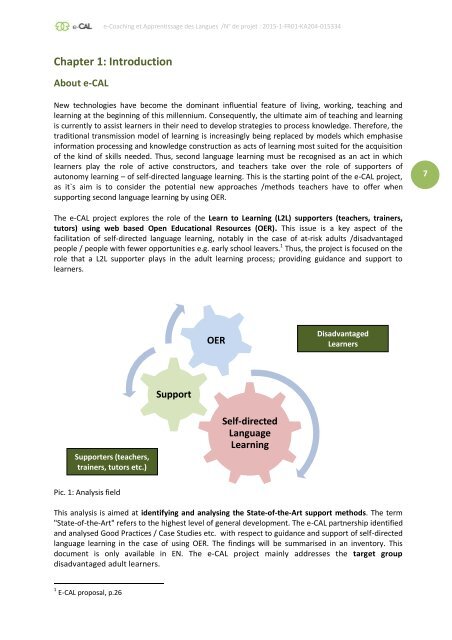e-CAL - e-Coaching et Apprentissage des Langues
The ERASMUS+ project e-CAL presents the result of an analysis of support methods in the case of language learning using web-based Open Educational Resources (OER).
The ERASMUS+ project e-CAL presents the result of an analysis of support methods in the case of language learning using web-based Open Educational Resources (OER).
You also want an ePaper? Increase the reach of your titles
YUMPU automatically turns print PDFs into web optimized ePapers that Google loves.
e-<strong>Coaching</strong> <strong>et</strong> <strong>Apprentissage</strong> <strong>des</strong> <strong>Langues</strong> /N° de proj<strong>et</strong> : 2015-1-FR01-KA204-015334<br />
Chapter 1: Introduction<br />
About e-<strong>CAL</strong><br />
New technologies have become the dominant influential feature of living, working, teaching and<br />
learning at the beginning of this millennium. Consequently, the ultimate aim of teaching and learning<br />
is currently to assist learners in their need to develop strategies to process knowledge. Therefore, the<br />
traditional transmission model of learning is increasingly being replaced by models which emphasise<br />
information processing and knowledge construction as acts of learning most suited for the acquisition<br />
of the kind of skills needed. Thus, second language learning must be recognised as an act in which<br />
learners play the role of active constructors, and teachers take over the role of supporters of<br />
autonomy learning – of self-directed language learning. This is the starting point of the e-<strong>CAL</strong> project,<br />
as it`s aim is to consider the potential new approaches /m<strong>et</strong>hods teachers have to offer when<br />
supporting second language learning by using OER.<br />
7<br />
The e-<strong>CAL</strong> project explores the role of the Learn to Learning (L2L) supporters (teachers, trainers,<br />
tutors) using web based Open Educational Resources (OER). This issue is a key aspect of the<br />
facilitation of self-directed language learning, notably in the case of at-risk adults /disadvantaged<br />
people / people with fewer opportunities e.g. early school leavers. 1 Thus, the project is focused on the<br />
role that a L2L supporter plays in the adult learning process; providing guidance and support to<br />
learners.<br />
OER<br />
Disadvantaged<br />
Learners<br />
Support<br />
Supporters (teachers,<br />
trainers, tutors <strong>et</strong>c.)<br />
Self-directed<br />
Language<br />
Learning<br />
Pic. 1: Analysis field<br />
This analysis is aimed at identifying and analysing the State-of-the-Art support m<strong>et</strong>hods. The term<br />
"State-of-the-Art" refers to the highest level of general development. The e-<strong>CAL</strong> partnership identified<br />
and analysed Good Practices / Case Studies <strong>et</strong>c. with respect to guidance and support of self-directed<br />
language learning in the case of using OER. The findings will be summarised in an inventory. This<br />
document is only available in EN. The e-<strong>CAL</strong> project mainly addresses the targ<strong>et</strong> group<br />
disadvantaged adult learners.<br />
1 E-<strong>CAL</strong> proposal, p.26


